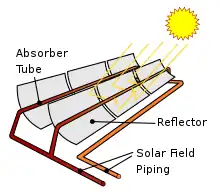| Shams I | |
|---|---|
 Shams 1 Parabolic Trough in Abu Dhabi | |
| Country | United Arab Emirates |
| Location | Madinat Zayed, Abu Dhabi |
| Coordinates | 23°34′10″N 53°42′50″E / 23.56944°N 53.71389°E |
| Status | Operational |
| Construction began | July 2010 |
| Commission date | 17 March 2013[1] |
| Construction cost | US$600 million |
| Owner(s) | Masdar (60%) Abengoa Solar (20%) Total S.A. (20%) |
| Solar farm | |
| Type | CSP |
| CSP technology | Parabolic trough |
| Collectors | 768[2] |
| Site resource | 1,934 kWh/m2/yr[2] |
| Site area | 2.5 km2 (1 sq mi) |
| Power generation | |
| Units operational | 1 |
| Nameplate capacity | 100 MW |
| Annual net output | 210 GWh |
| External links | |
| Commons | Related media on Commons |
Shams Solar Power Station (Arabic: شمس, lit. 'Sun') is a concentrating solar power station near Madinat Zayed, Abu Dhabi, the United Arab Emirates. The solar power station is located approximately 120 kilometres (75 mi) southwest of Abu Dhabi and 6 kilometres (4 mi) from Madinat Zayed on the road from Tarif to the Liwa Oasis.[3]
The Shams station is planned to eventually include 3 plants: Shams 1 became operational on 17 March 2013.[1][4] Using parabolic trough technology with a capacity of 100 megawatts (MW), Shams 1 was the largest concentrated solar power (CSP) facility in the world when it opened.[5][6] Shams 1 will be followed by the Shams 2 and Shams 3 power plants.[1][7] The website Shamspower describes the impact and sustainability factors of the solar power plant.
Description

Shams 1 is a 100 MW concentrating solar power station which uses parabolic trough technology. It displaces 175,000 tons of CO2 per year and its power output is enough to power 20,000 homes. The station consists of 258,048 parabolic trough mirrors, 192 solar collector assembly loops with 8 solar collector assemblies per loop, 768 solar collector assembly units, and 27,648 absorber pipes. It covers an area of approximately 2.5 square kilometres (0.97 sq mi).[8][9]
The basic and detailed engineering have been developed by AG Ingeniería. The project is consulted by Fichtner Consulting Engineers.[10] The equipment is designed and delivered by Foster Wheeler.[11] The power station is equipped by Abengoa Solar's ASTRO collectors. The 125 MW steam turbine is provided by MAN Turbo, parabolic glass mirrors are provided by Flabeg, PTR 70 absorber tubes are provided by Schott AG, and Therminol heat transfer fluid is provided by Solutia.[6][12]
In October 2010 it was reported that because of "substantial" atmospheric dust, solar radiation received by Shams' solar collectors was less than expected and more collectors would be required.[3]
Technical specifications
- Solar-Field Aperture Area: 627,840 m²[2]
- Number of Loops: 192[2]
- Number of SCAs per Loop: 4[2]
- SCA Length: 150 m[2]
- Number of Modules per SCA: 12[2]
- SCA Manufacturer (Model): Abengoa Solar (ASTRO)[2]
- Mirror Manufacturer (Model): Flabeg (RP3)[2]
- Number of Heat Collector Elements (HCEs): 27,648[2]
- HCE Manufacturer (Model): Schott (PTR 70)[2]
- Heat-Transfer Fluid Type: Therminol VP-1[2]
- HTF Company: Solutia[2]
- Solar-Field Inlet Temp: 300°[2]
- Solar-Field Outlet Temp: 400°[2]
- Turbine Manufacturer: MAN[2]
- Output Type: Steam Rankine[2]
- Cooling Method: Dry cooling[2]
- Fossil Backup Type: Natural Gas Boiler[2]
Developer
The project is developed by the Shams Power Company, a special purpose vehicle of Abu Dhabi Future Energy Company (Masdar) in cooperation with Spain's Abengoa Solar and France's Total S.A.[3] Masdar has 60% in the project while Abengoa Solar and Total S.A. each have 20%.[13] The power station is developed under a 25-year build, own and operate contract. Bids to build and operate the power station were made by several international consortia. In addition to Abengoa Solar and Total S.A., Saudi Arabia's ACWA Power and Spain's Iberdrola, Germany's MAN Ferrostaal and Solar Millennium, and Spain's Grupo Cobra and Grupo Sener made their bids.[10]
Financing
The construction cost of Shams 1 is about US$600 million.[4][3] The project is financed by 10 regional and international lenders including BNP Paribas, the National Bank of Abu Dhabi and Société Générale.[8]
See also
References
- 1 2 3 "Riesiges Sonnenwärmekraftwerk startet Betrieb" [Huge solar thermal power plant starts operation]. Der Spiegel (in German). 17 March 2013. Retrieved 17 March 2013.
- 1 2 3 4 5 6 7 8 9 10 11 12 13 14 15 16 17 18 19 Shams 1. National Renewable Energy Laboratory. U.S. Department of Energy. Retrieved: 2013-3-19
- 1 2 3 4 Sills, Ben; Daya, Ayesha (2010-10-27). "Dust Blocking Sun Rays at Solar Plant in Abu Dhabi, Masdar Official Says". Bloomberg. Retrieved 2012-01-12.
- 1 2 "Shams 1 | Concentrating Solar Power Projects". National Renewable Energy Laboratory. Retrieved 15 September 2022.
- ↑ Quick, Darren (19 March 2013). "World's largest concentrated solar power plant opens in the UAE". New Atlas. Retrieved 15 September 2022.
- 1 2 Webb, Chris (2009-06-01). "Sun Shines on Turbine Makers". Power Engineering International. PennWell Corporation. Retrieved 2012-01-12.
- ↑ Al Makahleh, Shehab (23 November 2012). "Milestone: Shams 1 set to tap solar power". Gulf News. Retrieved 25 November 2012.
- 1 2 "Concentrating solar power in the United Arab Emirates: Shams 1 project secures financial close". SolarServer. 2011-03-07. Archived from the original on 2011-03-13. Retrieved 2011-01-12.
- ↑ Daya, Ayesha (June 9, 2010). "Abengoa Joins Masdar, Total on Middle East's First Solar Plant". Bloomberg Businessweek. Bloomberg. Retrieved 2010-06-08.
- 1 2 "Masdar - Shams 1 Concentrating Solar Power (CSP) Plant". ABQ Zawya Ltd. (subscription required). Retrieved 2009-08-01.
- ↑ "Foster Wheeler to supply 100 MW solar power plant to Abu Dhabi". Power Engineering. PennWell Corporation. 2010-11-22. Retrieved 2012-01-13.
- ↑ "MAN Turbo bags steam turbines order for world's largest solar power plant". Power Engineering. PennWell Corporation. 2009-04-28. Retrieved 2012-01-13.
- ↑ "Masdar partners with Total and Abengoa Solar on Sham 1 project". Power Engineering. PennWell Corporation. 2010-06-14. Retrieved 2012-01-13.